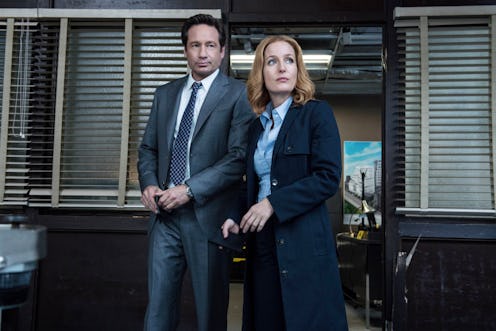Entertainment
'The X-Files' Makes A Valid Point On Culpability

When a detective in Philadelphia encounters a "spooky" murder case, who does he call? Mulder and Scully of course, because everyone knows they're the ultimate experts when it comes to these types of cases. In the Feb. 8 X-Files episode "Home Again," the agents head to a crime scene where a federal employee has been killed — apparently by a creature that can't be human, as evidenced by the fact that his apparent footprints have no ridges. The victim, Joseph Cutler, was building a luxury apartment building in the neighborhood and therefore driving the homeless population out of the area in order to gentrify it — so, it's safe to say he had a few enemies. Though this may seem like a straightforward "monster of the week" episode, its theme raises important issues about blame.
After receiving news that her mother has suffered a heart attack, Scully leaves the scene moments after arriving, but Mulder stays in Philadelphia to investigate before ultimately joining her in D.C. He interviews Nancy Huff, head of the Bucks County School Board, who expresses her disdain for Cutler and his business partner, Daryl Landry, because they're sending homeless people to a facility near her schools. It's established that none of these people care about the well-being of the homeless population, and they're at odds because none of them want to deal with or help the impoverished individuals living on the street.
Mulder recovers a band-aid from Cutler's body, which lab techs confirm holds no organic or inorganic material — furthering the notion that the killer can't be human. He finds clues through street art located near the crime scene and learns that it was created by Trash Man, an anonymous street artist who has never been seen. Mulder concludes that he's "a mission-oriented killer who believes he's helping the homeless by eliminating those involved in relocation." He takes a break from the case to be with Scully at the hospital and, during this time, Nancy Huff is murdered in her home by the same non-human entity that killed Cutler. Moments after her mother dies, Scully demands to go back to Philadelphia to continue working the case.
The agents track down Trash Man and, after an old-school chase through a warehouse complete with flashlights, they question him about the murders. He expresses that, not only do the homeless people have no voice, but they get treated like "trash, actual trash" by people like Cutler and Huff who simply want to move them out of their sight so they'll be someone else's problem. So, did this artist kill them? Not exactly — he created a piece of art called The Band-Aid Nose Man, who ultimately came to life and decided what he wanted to be. Trash Man acknowledges that he feels violent emotions towards the murder victims, but he's not responsible for their deaths because his creation takes his ideas and believes he's supposed to act on them.
As he explains all this, Scully appears to be lost in thought and consumed by flashbacks of William — but she's heard every word and tells Trash Man that he's responsible for the murders because he created the killer and did nothing to stop his violence. "You put it out of sight so that it wouldn't be your problem. But you're just as bad as the people that you hate," she explains. Of course, it's clear to viewers that she's also talking about her own situation — she blames herself for putting William "out of sight" and feels that she's still responsible for him.
Scully and Mulder realize that Landry will be the next victim and they rush to find him, but he's murdered while they're in the building — and Mulder once again finds a band-aid next to the body. Although the case of the week in "Home Again" ultimately took a backseat to the storyline of Margaret Scully's death, it raised a number of important points about culpability and taking responsibility for what's happening around us. Scully's being heartbreakingly unfair to herself if she thinks she's "just as bad" as the people who targeted her son, but Trash Man's story relays a valid message about the dangers of turning a blind eye.
Everyone from Cutler to Huff to Trash Man refused to take responsibility for their actions, and it resulted in horrific mistreatment of the homeless population and three murders. Furthermore, there will be people who take over the murder victims' jobs and continue the vicious cycle — so these acts of vigilante justice did nothing to help the homeless. The case wasn't as fleshed out as a typical X-File, but it still managed to pack a punch and make an important point.